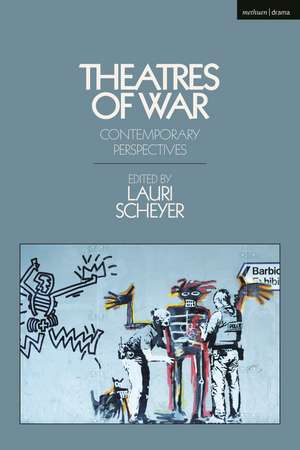Theatres of War: Contemporary Perspectives
Editat de Lauri Scheyeren Limba Engleză Paperback – 19 apr 2023
| Toate formatele și edițiile | Preț | Express |
|---|---|---|
| Paperback (1) | 190.75 lei 6-8 săpt. | |
| Bloomsbury Publishing – 19 apr 2023 | 190.75 lei 6-8 săpt. | |
| Hardback (1) | 568.48 lei 6-8 săpt. | |
| Bloomsbury Publishing – 20 oct 2021 | 568.48 lei 6-8 săpt. |
Preț: 190.75 lei
Preț vechi: 249.05 lei
-23% Nou
Puncte Express: 286
Preț estimativ în valută:
36.50€ • 39.64$ • 30.66£
36.50€ • 39.64$ • 30.66£
Carte tipărită la comandă
Livrare economică 22 aprilie-06 mai
Preluare comenzi: 021 569.72.76
Specificații
ISBN-13: 9781350264830
ISBN-10: 1350264830
Pagini: 216
Dimensiuni: 156 x 234 mm
Greutate: 0.31 kg
Editura: Bloomsbury Publishing
Colecția Methuen Drama
Locul publicării:London, United Kingdom
ISBN-10: 1350264830
Pagini: 216
Dimensiuni: 156 x 234 mm
Greutate: 0.31 kg
Editura: Bloomsbury Publishing
Colecția Methuen Drama
Locul publicării:London, United Kingdom
Caracteristici
Renowned writers explain how theatre can help us understand war by providing individual perspectives on this experience and its devastating impact
Notă biografică
Lauri Scheyer is Xiaoxiang Scholars Program Distinguished Professor, Director of the British and American Poetry Research Center, and Co-editor of Journal of Foreign Languages and Cultures at Hunan Normal University, China. She directed the British Council International Videoconference on The Great Game: Afghanistan, and co-directed (with Professor Robert Eaglestone of Royal Holloway University of London) the British Council International Videoconferences on Black Watch and the 200th Anniversary of the Abolition of the British Slave Trade. She publishes widely on topics relating to art as social and political action. Her books include Slave Songs and the Birth of African American Poetry, The Heritage Series of Black Poetry, and A History of African American Poetry.
Cuprins
Contributor BiographiesIntroduction, Lauri Scheyer, Hunan Normal University, China Section I: British and American Perspectives on Theatres of War "Carry on to the Place of Pain:" Embodiment and Aversion in Sean O'Casey's The Silver Tassie, Robert Brazeau, University of Alberta in Edmonton, Canada "I Do Want to Take Part in this Show:" The Early War Diary as Rehearsal Stage for the Creation and Navigation of the Newly Militarized Masculine Self, Nancy Martin, Rutgers University, USA Mothers and Lovers Mourning Fallen Soldiers: Tracing the Shift from Victorian Age to Interwar Period Mourning in Noël Coward's Post-Mortem, Anna Rindfleisch, Kings College London, UK The Romans at War: Shakespeare's Julius Caesar and Antony and Cleopatra on the Nazi Stage, Alessandra Bassey, Kings College London, UKTerror and Eros in Ernest Hemingway's The Fifth Column-A Play on the Spanish Civil War, Jon Woodson, Howard University, USA Joshua McCarter Simpson's Counter-Performances of American Civil War Nationalism, Lauri Scheyer Performing Trauma: Narratives of Rupture in Caryl Churchill's Seven Jewish Children, Mamata Sengupta, Islampur College, North Bengal University, India Two Truths and a Lie: Theatrical Form, Plays About Terrorism, and the Search for Understanding, Lindsey Mantoan, Linfield College, Oregon, USA Section II: Global Perspectives on Theatres of War Reenacting the Record: Theatrical Historiography in Alfian Sa'at's Tiger of Malaya, Kevin Riordan, Nanyang Technological University, Singapore Ferenc Molnár's White Cloud and World War I, Márta Pellérdi, Pázmány Péter Catholic University, Hungary Presenting Picasso Presents: Exploring the Process of Crafting and Staging Historical Docudrama, Annika C. Speer and Begoña Echeverria, UC Riverside, USA War, Tyranny, and Political Sacrifice in Luis Vélez de Guevara's Más pesar el reyque la sangre y blasón de los Guzmanes, Alani Hicks-Bartlett, Brown University, USA Seeing Through Discursive Screens in Matei Visniec's The Body of a Woman as a Battlefield in The Bosnian War, Oana Popescu-Sandu, University of Southern Indiana, USA Wartime Gender Advocacy and Revival of Theatre in Afghanistan, Bahar Jalali, independent scholar Section III: Perspectives on Black Watch Unities, Communities, and Disunities in Gregory Burke's Black Watch, Kate McLoughlin, University of Oxford, UK Better Break It: A Case Study of Black Watch, Christopher Merrill, University of Iowa, USA Gallant Forty Twa: The National Theatre of Scotland's Black Watch as Exemplary and Relevant Political Theatre, Shawn Lent , Columbia College Chicago, USA Black Watch and the Edinburgh Military Tattoo: Legacies of Scotland's Martial Identity, Lynn Ramert, University of Nebraska, USA Performing War: The Meaning of the Missing Sign of War in Media and Theatre, Eva Aldea, University of London, UK Section IV: Perspectives on The Great Game: Afghanistan "My Country Has Been Imagined Enough:" The Great Game, Neo-imperialism, and Gender, Daniel O'Gorman, Oxford Brookes University, UK and Emer O'Toole, Concordia University, CanadaThe Geography of Identity, Reza Aslan, University of California, USA The Legacy of an Empire, Farid Younos, California State University, USA Imagining The Great Game, Christopher Merrill Staging the Catastrophe: The Tricycle Theatre's The Great Game: Afghanistan and Its Diplomatic Journey from London to the Pentagon, 2010-11, Nicholas J. Cull, University of Southern California, USA The Freedom of Boredom, Shane Belvin, independent scholar Understanding Theatres of War: From Ancient Greece to Afghanistan to DARPA, Tyler Reeb, Center for International Trade & Transportation, USA Index
